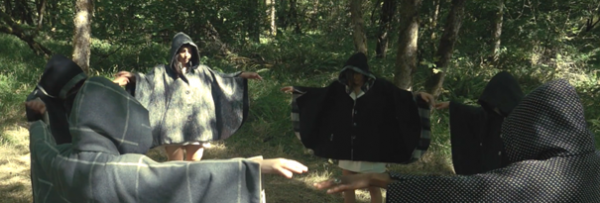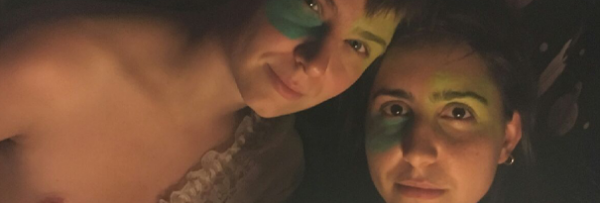A still from Forest Veil’s ‘Harem’ music video; Photo: Forest Veil
Based in the misty forest, progressive lifestyle haven of Portland, Oregon, Spirit House Records defines itself as “a magical, radically artist-friendly record label empowering free spirits to make art on their own terms,” encompassing “a community of healers, activists, witches, faeries, and star-children helping each other deliver medicine to the world.”
We could easily get heady and cosmic on what this means to the 28-year-old founder, musician Johanna Warren, let alone the eight other artists currently on the fledgling label’s roster, but reducing it down to brass tacks, Warren tells us in an interview: “We are a label for independent artists who are choosing to maintain control of our own finances without middlemen.”
Stretching back to at least the 1950s, independent record labels existed in pretty much every genre, favoring art over sales and promising to protect artists from gaggles of notes-giving executives and percentage-munching label hands.
In fact, given its Kickstarter manifesto to “reject competitive individualism in favor of collective empowerment” in order to “elevate femme and non-binary voices as a counterweight to the patriarchal mainstream,” if Spirit House has a direct precedent, it may be Portland’s famed Kill Rock Stars label, home to a few of the sonic founders of the Riot Grrrl movement of the early 1990s. Bands like Sleater-Kinney and Bikini Kill created defiantly anti-commercial music meant to empower women and gender non-conformers and turn the tables on male-dominated power structures. KRS co-founder founder Slim Moon—a man—said he “wanted to be invisible.” He told Hit Quarters, “Instead of telling them how to do things, I just wanted to be able to help the artists realize their own vision.”
The Riot Grrrl movement thrived on this as more of an ideology than a financial structure, of course—whether or not Kathleen Hanna and Bikini Kill made 100 percent of the profits on “Rebel Girl” was an afterthought to its middle-finger to the patriarchy.
While Spirit House similarly places art over commerce, its approach is more mystical than punk aggressive. Sonically, Warren’s ethereal voice floats on cymbal-washed anti-folk tunes that are juxtaposed with her work in the healing arts and an affinity for the metaphysical and mystical. A certified Reiki Master who openly identifies as a witch, Warren uses Shamanism as a metaphor for the energy she chases. “The artist is the shaman who is guiding the experience and bringing us into places of discord and then resolving it back into a place of harmony,” says Warren. Spirit House is a place where the music world’s shamans can feel free.
And it’s also evolving away from the “non-binary” and “femme” definitions it initially sought to foster, instead seeking “to be inclusive to beings of all genders,” Warren explains. “We just got to a place where it just felt like we didn’t want to be creating any walls or solidifying any walls that are based in binary thinking, and perpetuating the old paradigm.”
Right now, there are few walls containing Spirit House’s musical output, which includes Warren’s own records (inspired by healing cycles of the moon and the zodiac); a harpist who goes by the name of Dolphin Midwives and has been known to gig at Portland’s churches; the off-kilter, coven of forest witches melodies of Forest Veil; the heel-kicking country-roots rock of Lola Kirke; and the sunshine singer-songwriter glisten of Ali Burress.
Indira Valey and Elliott Harvey basking in the afterglow of a collaborative ritual performance at the Spirit House mini-fest, September 2017; Photo: Suzanne Olvey
But back to Spirit House’s ambition to eliminate the middle men—with a combination of crowdsourced funding ($12,000 successful campaign on Kickstarter) and direct-to-artist sales on Bandcamp (aside from Bandcamp’s cut), Spirit House is currently enabling its roster to both retain 100 percent of the rights to their music and recoup 100 percent of the profits. In exchange for this freedom, the artists cover typical label objectives like press, distribution, and studio time, while reaping the benefits of being associated with Spirit House’s brand and community.
At least for now. The $12,000 accrued on Kickstarter went toward the first nine releases for each artist currently on the roster. The remainder of the budget went toward additional artist needs on a work-trade basis. For instance, Monica of Forest Veil needed $500 to press some extra copies of her record, so she logged a commensurate number of hours mailing stuff out for the label until she paid it off.
Now that that the initial $12,000 is depleted, Warren is looking to longer term crowdsourcing campaigns like Patreon, where consumers pay a monthly membership to support an artist or project over time. While she says that the next round of funding will have “really modest ambitions just to break even” on fixed costs like maintaining a web site, Warren’s larger plan is “opening that portal just to ask for support from the larger community of people who believe in what we’re doing.”.
And what they’re doing is quite unlike anything attempted by other record labels, independent or not. “We’ve done a couple events in the last year where we’ve linked up with healers in the community—astrologers, Reiki masters, Tarot readers—and had a sort of metaphysical faire before and during the music,” said Warren. “Music is woven into a broader culture of the healing arts.”
In other words, you don’t need to be a witch or a healer to benefit from a business model that lets you retain as much creative and financial control as possible, but in Spirit House’s case, it helps.
Check out Spirit House’s original Kickstarter launch page here, and watch Forest Veil’s ‘Harem’ featuring Johanna Warren below:
Tags: Forest Veil, Johanna Warren, Spirit House


